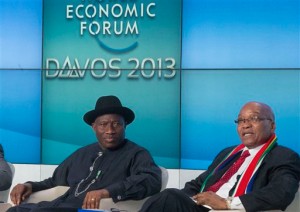

Follow us on:  
|


South African President Jacob Zuma (r) and Nigerian President Goodluck Jonathan. [AP]
During a televised debate on the sidelines of the annual World Economic Forum summit in Davos, Switzerland, the African leaders pledged that they will build on solid economic gains in the past few years to increase intra-continental trade and become foreign investment destinations.
While average GDP for the continent grew at five per cent in the past two years, the IMF is forecasting growth of around 5.8 per cent in 2013 and 5.7 per cent in 2014, making the continent the world’s second-fastest growing region.
According to the McKinsey Quarterly business journal “real GDP rose by 4.9 per cent a year from 2000 through 2008, more than twice its pace in the 1980s and ’90s.
Telecommunications, banking, and retailing are flourishing. Construction is booming. Private-investment inflows are surging.”
The World Bank says that such growth is “quickly changing lives, driving entrepreneurship fueled in part by collaborative technology hubs, and delivering innovation and home-grown solutions for Africa”.
Africa’s focus is now on intra-continental trade.
“We realise that intra-trade is not enough and are working hard on that,” Zuma said.
He told audience members that an agreement between the East African Community (EAC), Common Market for Eastern and Central Africa (Comesa) and Southern African Development Community (SADC) to create a 26-nation free trade area covering southern, central and east Africa.
He also said that several countries, including South Africa, were focusing on updating infrastructure.
Some of the attendees raised questions about Africa’s security environment and how that could hinder development. The recent hostage crisis in Algeria, the French intervention against Al-Qaeda affiliated groups in Mali, and the one-month civil war in Central Africa Republic were high on the list of concerns about conflict in Africa.
Two weeks ago, IMF chief Christine Lagarde told leaders in the Ivory Coast that investments will increase in Africa with the promise of peace and stability.
Source: Agencies